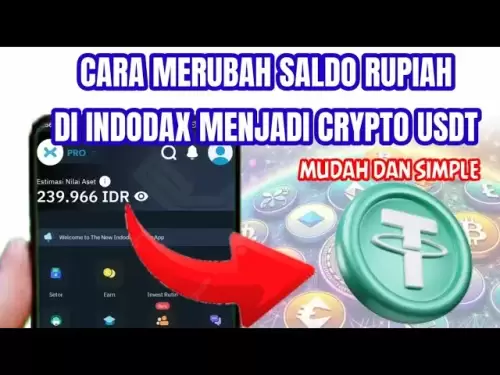-
 Bitcoin
Bitcoin $107,443.3008
-1.17% -
 Ethereum
Ethereum $2,494.2503
-0.63% -
 Tether USDt
Tether USDt $1.0003
0.00% -
 XRP
XRP $2.2496
2.23% -
 BNB
BNB $658.7569
0.63% -
 Solana
Solana $154.9826
1.94% -
 USDC
USDC $1.0000
0.01% -
 TRON
TRON $0.2799
1.07% -
 Dogecoin
Dogecoin $0.1659
-1.78% -
 Cardano
Cardano $0.5745
0.25% -
 Hyperliquid
Hyperliquid $39.7005
0.13% -
 Bitcoin Cash
Bitcoin Cash $519.5989
3.78% -
 Sui
Sui $2.7874
-2.40% -
 Chainlink
Chainlink $13.3762
-1.69% -
 UNUS SED LEO
UNUS SED LEO $9.0784
-0.64% -
 Avalanche
Avalanche $17.9846
-2.81% -
 Stellar
Stellar $0.2390
-0.06% -
 Toncoin
Toncoin $2.9028
0.25% -
 Shiba Inu
Shiba Inu $0.0...01147
-2.17% -
 Litecoin
Litecoin $86.6956
-1.27% -
 Hedera
Hedera $0.1508
-0.50% -
 Monero
Monero $322.6222
3.26% -
 Polkadot
Polkadot $3.4124
-2.99% -
 Dai
Dai $0.9999
0.00% -
 Bitget Token
Bitget Token $4.5434
-1.97% -
 Ethena USDe
Ethena USDe $1.0002
0.00% -
 Uniswap
Uniswap $7.1562
-2.61% -
 Aave
Aave $275.8830
-1.02% -
 Pepe
Pepe $0.0...09790
-4.04% -
 Pi
Pi $0.5018
-5.09%
How to calculate Exodus staking income? How often is it issued?
Calculate your staking income in Exodus using the formula: Amount Staked × Staking Rewards Rate × Staking Period; rewards are issued at varying frequencies depending on the cryptocurrency.
May 05, 2025 at 07:14 am
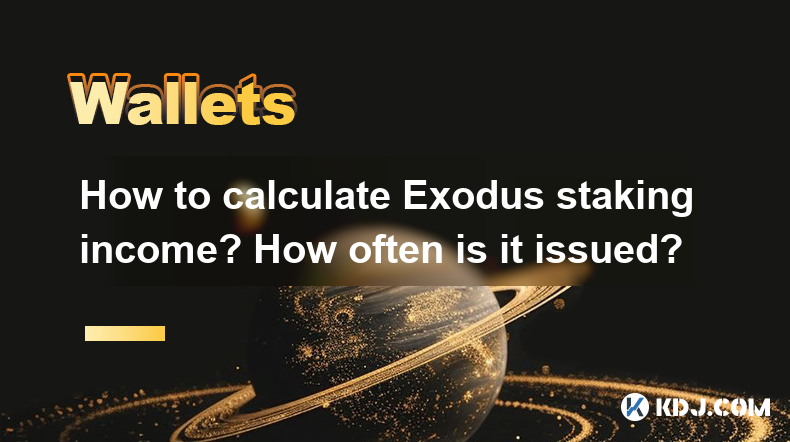
Calculating your staking income with Exodus and understanding the frequency of its issuance are crucial aspects of maximizing your returns in the cryptocurrency space. This article will guide you through the process of calculating your staking income, explain how often it is issued, and provide detailed insights into managing your staking rewards effectively.
Understanding Staking in Exodus
Staking is the process of holding funds in a cryptocurrency wallet to support the operations of a blockchain network. In return, participants receive rewards, often in the form of additional cryptocurrency. Exodus Wallet supports staking for various cryptocurrencies, allowing users to earn passive income on their holdings. To get started with staking, you need to hold supported cryptocurrencies in your Exodus wallet and enable the staking feature for those assets.
Calculating Staking Income in Exodus
To calculate your staking income in Exodus, you need to consider several factors:
- Staking Rewards Rate: Each cryptocurrency has its own staking rewards rate, which can vary based on the network's total staked amount and other factors. You can find the current staking rewards rate for your cryptocurrency within the Exodus wallet.
- Amount Staked: The total amount of cryptocurrency you have staked directly impacts your rewards. The more you stake, the higher your potential rewards.
- Staking Period: The duration for which you stake your cryptocurrency can also affect your earnings. Some networks offer higher rewards for longer staking periods.
To calculate your staking income, you can use the following formula:
[ \text{Staking Income} = \text{Amount Staked} \times \text{Staking Rewards Rate} \times \text{Staking Period} ]
For example, if you stake 1000 ADA with a staking rewards rate of 5% annually, your annual staking income would be:
[ 1000 \times 0.05 = 50 \text{ ADA} ]
Frequency of Staking Income Issuance
The frequency at which staking income is issued can vary depending on the cryptocurrency and the network's protocol. In Exodus, staking rewards are typically distributed as follows:
- ADA (Cardano): Rewards are distributed every epoch, which is approximately every 5 days.
- ATOM (Cosmos): Rewards are distributed daily.
- XTZ (Tezos): Rewards are distributed every 3 days.
To check the exact frequency for your staked cryptocurrency, you can:
- Open your Exodus wallet.
- Navigate to the staking section for the specific cryptocurrency.
- Look for information on reward distribution frequency.
Managing Your Staking Income
Once you start earning staking income, it's important to manage it effectively to maximize your returns. Here are some steps to help you manage your staking rewards:
- Reinvesting Rewards: Consider reinvesting your staking rewards to compound your earnings. This means staking your rewards along with your initial stake to earn more over time.
- Diversifying: Don't put all your eggs in one basket. Consider staking multiple cryptocurrencies to spread risk and potentially increase your overall returns.
- Monitoring Performance: Regularly check the performance of your staked assets. Use the Exodus wallet to track your staking income and adjust your strategy as needed.
Troubleshooting Common Staking Issues
While staking with Exodus is generally straightforward, you may encounter some common issues. Here's how to address them:
- Rewards Not Showing Up: If your staking rewards are not appearing in your wallet, ensure that you have enabled staking for the cryptocurrency and that your wallet is connected to the internet. Sometimes, rewards may take a few hours to reflect in your wallet.
- Staking Not Available: If staking is not available for a particular cryptocurrency, it may be due to network issues or updates. Check the Exodus support page for any known issues or updates.
- Transaction Fees: Be aware of any transaction fees associated with staking. Some networks require a small fee to process staking rewards, which can impact your net income.
Advanced Staking Strategies
For those looking to optimize their staking income, consider these advanced strategies:
- Staking Pools: Joining a staking pool can increase your chances of earning rewards, especially for smaller stakers. Pools combine the stakes of multiple participants to increase the chances of validating blocks and earning rewards.
- Delegation: Some networks allow you to delegate your stake to a validator or node operator. This can be a good option if you don't want to run your own node but still want to participate in staking.
- Staking Calculators: Use online staking calculators to estimate your potential earnings based on different variables such as stake amount, rewards rate, and staking period. These tools can help you make informed decisions about your staking strategy.
Frequently Asked Questions
Q: Can I unstake my cryptocurrency at any time?
A: The ability to unstake your cryptocurrency depends on the specific network's rules. Some networks allow you to unstake at any time, while others may have a lock-up period during which your funds are not accessible. Check the staking rules for your cryptocurrency within the Exodus wallet to understand the unstaking process.
Q: Are there any risks associated with staking in Exodus?
A: Yes, there are risks associated with staking, including the potential for network issues, slashing penalties for validator misbehavior, and fluctuations in the value of the staked cryptocurrency. Always research the specific risks associated with the cryptocurrency you are staking.
Q: How do I know if my staking rewards are taxable?
A: Staking rewards may be considered taxable income in some jurisdictions. It's important to consult with a tax professional to understand your tax obligations based on your location and the specific cryptocurrencies you are staking.
Q: Can I stake multiple cryptocurrencies at the same time in Exodus?
A: Yes, Exodus allows you to stake multiple cryptocurrencies simultaneously. Each cryptocurrency will have its own staking rules and rewards, so you can diversify your staking portfolio within the same wallet.
Disclaimer:info@kdj.com
The information provided is not trading advice. kdj.com does not assume any responsibility for any investments made based on the information provided in this article. Cryptocurrencies are highly volatile and it is highly recommended that you invest with caution after thorough research!
If you believe that the content used on this website infringes your copyright, please contact us immediately (info@kdj.com) and we will delete it promptly.
- Solana, Pepe Coin, Crypto Meme Mania: What's Hot and What's Not?
- 2025-07-01 19:10:12
- Bitcoin Cash Price Pump: Unpacking the Reasons Behind the Surge
- 2025-07-01 18:30:12
- Dogecoin's Wild Ride: Rally Potential Amidst Investor Panic?
- 2025-07-01 19:10:12
- Algorand, Wormhole, and Interoperability: A New Dawn for DeFi
- 2025-07-01 19:15:12
- CATL's Indonesian Battery Blitz: A 6 Billion Dollar Bet on the Future
- 2025-07-01 19:20:14
- Bitcoin, PEP-20, and the Token Standard Revolution: Is Bitcoin Pepe the Next Big Thing?
- 2025-07-01 18:30:12
Related knowledge
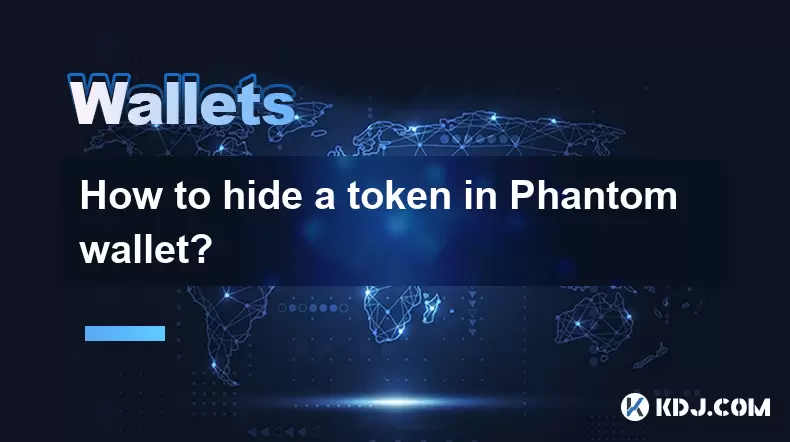
How to hide a token in Phantom wallet?
Jul 01,2025 at 05:49pm
Understanding the Phantom Wallet InterfacePhantom wallet is a popular non-custodial wallet used primarily for interacting with the Solana blockchain. It allows users to store, send, receive, and manage various tokens, including both fungible and non-fungible tokens (NFTs). Before attempting to hide a token, it's essential to understand how the wallet in...
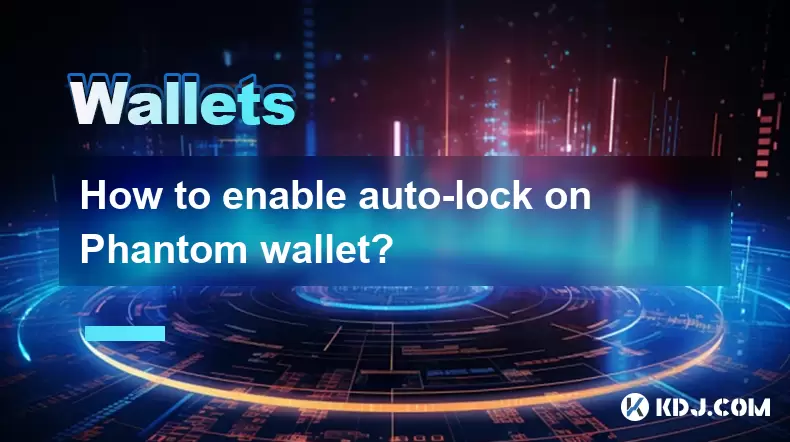
How to enable auto-lock on Phantom wallet?
Jul 01,2025 at 04:01pm
What is Auto-Lock in Phantom Wallet?Phantom wallet is a popular non-custodial cryptocurrency wallet used primarily for interacting with the Solana blockchain. One of its security features includes the ability to set an auto-lock timer, which ensures that the wallet locks itself automatically after a period of inactivity. Auto-lock enhances security by p...
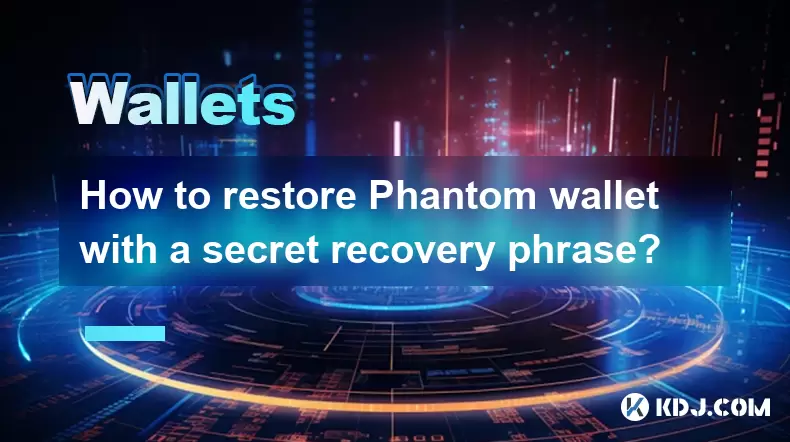
How to restore Phantom wallet with a secret recovery phrase?
Jul 01,2025 at 02:56pm
What is a Phantom wallet and why might you need to restore it?Phantom is a popular non-custodial cryptocurrency wallet primarily used for interacting with the Solana blockchain. It allows users to store, send, receive, and stake SOL tokens as well as manage NFTs and other SPL tokens. Since Phantom wallet is non-custodial, users are solely responsible fo...
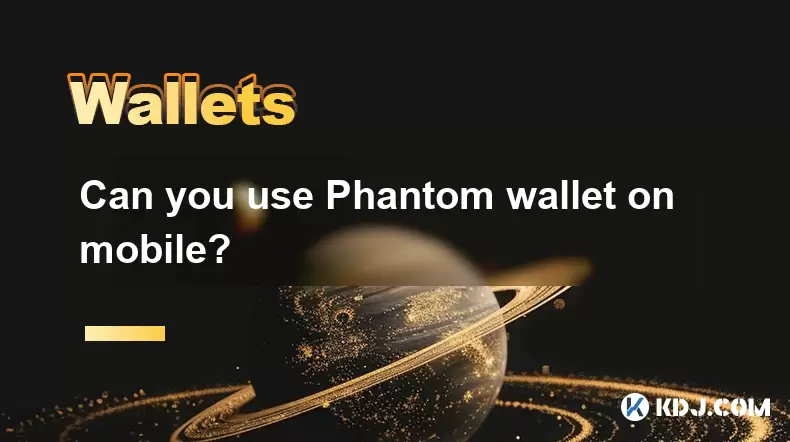
Can you use Phantom wallet on mobile?
Jul 01,2025 at 06:07pm
Understanding Phantom Wallet and Its Mobile CompatibilityPhantom wallet is a non-custodial cryptocurrency wallet primarily designed for interacting with the Solana blockchain. Initially developed as a browser extension, Phantom has expanded its functionality to include mobile platforms. This means users can access their Solana-based assets on mobile dev...
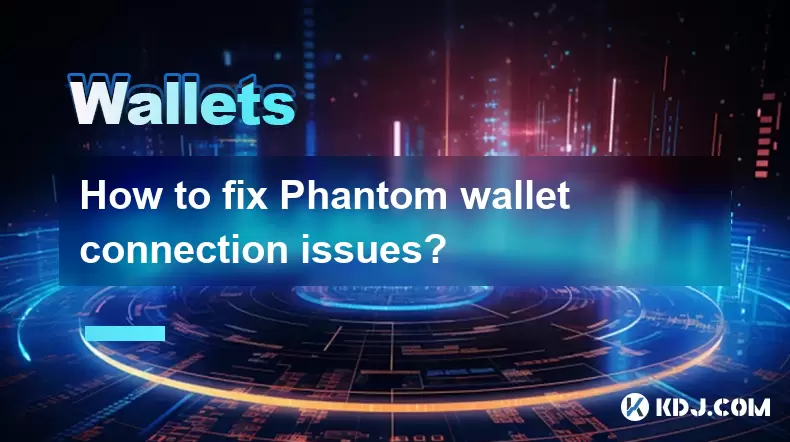
How to fix Phantom wallet connection issues?
Jul 01,2025 at 02:21pm
Understanding Phantom Wallet Connection IssuesPhantom wallet is one of the most popular non-custodial wallets for interacting with Solana-based decentralized applications (dApps). However, users occasionally face connection problems when trying to link their wallet to a dApp or platform. These issues can manifest as error messages, failed connection att...
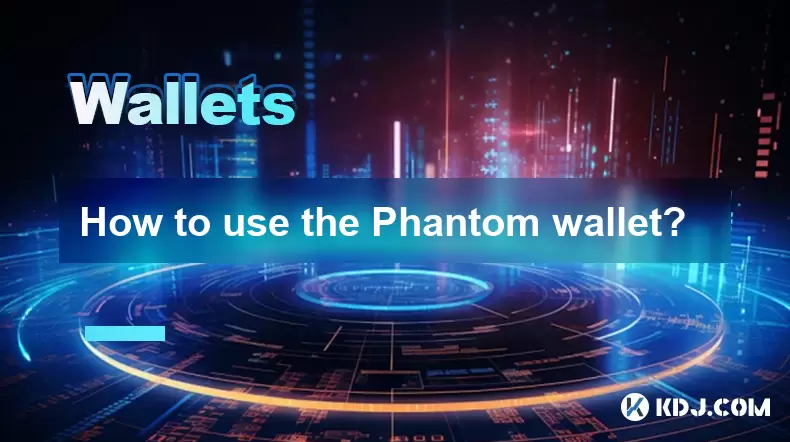
How to use the Phantom wallet?
Jul 01,2025 at 06:01pm
What is the Phantom Wallet and Why Use It?The Phantom wallet is a non-custodial cryptocurrency wallet specifically designed for interacting with the Solana blockchain. Unlike custodial wallets, where a third party holds your private keys, Phantom gives users full control over their assets. This ensures that users maintain ownership of their private keys...

How to hide a token in Phantom wallet?
Jul 01,2025 at 05:49pm
Understanding the Phantom Wallet InterfacePhantom wallet is a popular non-custodial wallet used primarily for interacting with the Solana blockchain. It allows users to store, send, receive, and manage various tokens, including both fungible and non-fungible tokens (NFTs). Before attempting to hide a token, it's essential to understand how the wallet in...

How to enable auto-lock on Phantom wallet?
Jul 01,2025 at 04:01pm
What is Auto-Lock in Phantom Wallet?Phantom wallet is a popular non-custodial cryptocurrency wallet used primarily for interacting with the Solana blockchain. One of its security features includes the ability to set an auto-lock timer, which ensures that the wallet locks itself automatically after a period of inactivity. Auto-lock enhances security by p...

How to restore Phantom wallet with a secret recovery phrase?
Jul 01,2025 at 02:56pm
What is a Phantom wallet and why might you need to restore it?Phantom is a popular non-custodial cryptocurrency wallet primarily used for interacting with the Solana blockchain. It allows users to store, send, receive, and stake SOL tokens as well as manage NFTs and other SPL tokens. Since Phantom wallet is non-custodial, users are solely responsible fo...

Can you use Phantom wallet on mobile?
Jul 01,2025 at 06:07pm
Understanding Phantom Wallet and Its Mobile CompatibilityPhantom wallet is a non-custodial cryptocurrency wallet primarily designed for interacting with the Solana blockchain. Initially developed as a browser extension, Phantom has expanded its functionality to include mobile platforms. This means users can access their Solana-based assets on mobile dev...

How to fix Phantom wallet connection issues?
Jul 01,2025 at 02:21pm
Understanding Phantom Wallet Connection IssuesPhantom wallet is one of the most popular non-custodial wallets for interacting with Solana-based decentralized applications (dApps). However, users occasionally face connection problems when trying to link their wallet to a dApp or platform. These issues can manifest as error messages, failed connection att...

How to use the Phantom wallet?
Jul 01,2025 at 06:01pm
What is the Phantom Wallet and Why Use It?The Phantom wallet is a non-custodial cryptocurrency wallet specifically designed for interacting with the Solana blockchain. Unlike custodial wallets, where a third party holds your private keys, Phantom gives users full control over their assets. This ensures that users maintain ownership of their private keys...
See all articles

























